Texas Top 40
Ranking the best Tex-Centric Billboard Top 40 hits of the last 50 years.
Fri., Nov. 8, 2002
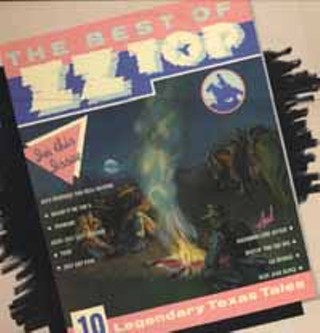
40. "Tush," ZZ Top (#20, 1975)
"Tush" combines the Top's adrenal electric blues boogie with an undeniably hooky lyric that found master guitarist/vocalist Billy Gibbons infusing a once-cute euphemism for the posterior with eternal randy-man prurience by emphasizing the "uhh."39. "The Gambler," Kenny Rogers (#16, 1978)
No Texas artist has had more success on the Billboard Top 40 than Houston-born Kenny Rogers. Though some of his hits have crossed into unforgivable schmaltz (e.g. "Lady"), "The Gambler" stands its ground as a song that helped spawn five (!) made-for-TV movies and a fast food chain.38. "Lowdown," Boz Scaggs (#3, 1976)
The laid-back, blue-eyed groove of Seventies soft rock is forever epitomized by Boz Scaggs' "Lowdown." Born in Ohio, but raised in Texas, Scaggs met guitarist Steve Miller in 1959 at St. Mark's School in Dallas and joined Miller's group, the Marksmen. After he parted with Miller in 1968, Scaggs' solo albums met with commercial indifference until 1976's Silk Degrees spawned "Lowdown."37. "Party Doll," Buddy Knox with the Rhythm Orchids (#1, 1957)
Formed in 1954 at West Texas State University in Canyon, Texas, the Rhythm Orchids cut the rockabilly classic "Party Doll" at Norman Petty's Clovis, N.M., studio in 1956. Guitarist Buddy Knox sang lead on "Party Doll," while bassist (and future country music impresario) Jimmy Bowen sang lead on the flip side, "I'm Sticking With You." Initially released on the Orchids' Triple-D label, the single was later purchased by the brand new Roulette label for national distribution. Knox died in 1999.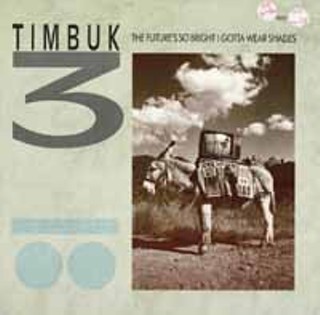
36. "The Future's So Bright, I Gotta Wear Shades," Timbuk 3 (#19, 1986)
Timbuk 3's Pat MacDonald and Barbara K. met in Madison, Wis., in 1978, bringing their beat-box-inflected folk to the Lone Star capital in 1983. After performing on the celebrated Austin episode of MTV's The Cutting Edge two years later, Timbuk 3 signed with show sponsor IRS Records and released "The Future's So Bright, I Gotta Wear Shades." Although its catch-phrase title obscured the song's potent satire, "Shades" captured the dichotomy between Reagan-era America platitudes and Cold War paranoia.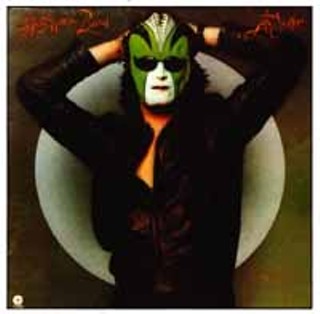
35. "The Joker," Steve Miller Band (#1, 1973)
Steve Miller was born in Milwaukee, but like his compatriot Boz Scaggs, he grew up and began his musical career in Dallas. "The Joker" was the breakthrough single that catapulted Miller to arena rock stardom, and despite being played to death, the song's trite gimmickry (whistling guitar, sex/dope references, the nonword "pompatus") make it a universal dude touchstone on the level of Caddyshack.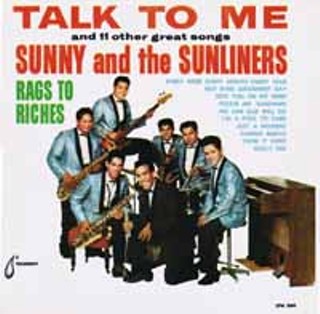
34. "Talk to Me," Sunny & the Sunglows (#11, 1963)
Sunny & the Sunglows' rendition of Little Willie John's "Talk to Me" was a seminal event in the development of Tex-Mex music. Cutting his teeth playing a rich mix of rock, R&B, and Tex-Mex at teen dances in San Antonio, bandleader Sunny Ozuna combined a soulful lead vocal with a cinematic, mariachi-inspired string arrangement tailor-made for slow dancing. Produced by Huey Meaux, the single propelled Ozuna and his band to national notoriety as the first Tejano act to appear on American Bandstand. Ozuna continues performing today as a revered Tejano legend.33. "I Can See Clearly Now," Johnny Nash (#1, 1972)
Houston-born Johnny Nash played a significant role in the commercial success of reggae in America. Starting out at 13 performing R&B covers on KPRC-TV's Matinee before being discovered by Arthur Godfrey, Nash had a hit in Jamaica with 1965's "Let's Move and Groove Together," and after touring there, recorded with Bob Marley & the Wailers on the 1972 album I Can See Clearly Now.32. "For the Good Times," Ray Price (#11, 1970)
Country singer Ray Price was born near Perryton, Texas, in 1926. He first achieved notoriety in 1948 as the "Cherokee Cowboy," performing live on Abilene's KRBC before joining the Big D Jamboree in Dallas, which was broadcast nationally over CBS radio. Price's early material was hard honky-tonk in the vein of Hank Williams, but his lushly orchestrated version of Kris Kristofferson's "For the Good Times" became a gem of Nashville's "countrypolitan" canon.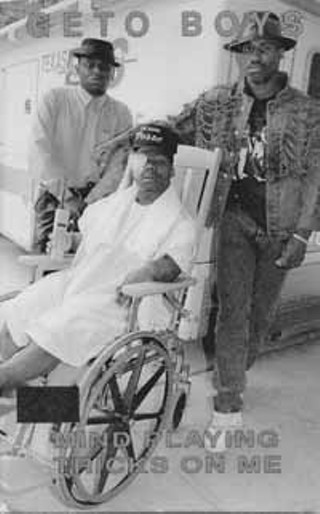
31. "Mind Playing Tricks on Me," Geto Boys (#23, 1991)
Coming up from rough Houston neighborhoods like South Acres and the Fifth Ward in the mid-Eighties, the Geto Boys stand alongside the D.O.C. as Texas' first significant rap exports. Though reviled for brutally graphic tales of rape and murder, 1991's "Mind Playing Tricks on Me" forwent the prevalent gangsta-style boasting and homed in on the pain, paranoia, and weaknesses brought on by thug life.30. "Drift Away," Dobie Gray (#5, 1973)
Born in Brookshire just west of Houston, Dobie Gray has wrapped his rich, malleable pipes around soul, country, and rock at one time or another. His most memorable song deftly combines elements from all three genres, "Drift Away" being a ubiquitous presence during the waning days of AM Top 40 in 1973. Gray never had another Top 10 hit, but he remains involved in music from his home in Nashville, recently providing guest vocals for a remake of "Drift Away" by Uncle Kracker.29. "Hot Smoke & Sasafrass," Bubble Puppy (#14, 1969)
The 13th Floor Elevators' "You're Gonna Miss Me" is the quintessential Texas psych anthem, but Bubble Puppy's "Hot Smoke & Sassafras" charted higher. Formed from the ashes of Corpus Christi's Bad Seeds, Bubble Puppy landed in Austin in 1967, honing their sound at the Vulcan Gas Company. Moving to Houston to record for International Artists, the quartet's forward-looking amalgam of psychedelia and hard rock took off in 1969. The band eventually relocated to California before calling it quits in 1972.28. "Hey Baby," Bruce Channel (#1, 1962)
Bruce Channel's one big hit was produced in Fort Worth by the legendary Major Bill Smith, a colorful and notoriously tight record biz character who also scored with Paul & Paula's "Hey Paula" and J. Frank Wilson & the Cavaliers' "Last Kiss." The hooks in "Hey Baby" are provided by Delbert McClinton's harmonica and Channel's own soaring vocal, and when Channel toured England in 1962 with the Beatles as an opening act, McClinton took time out to give John Lennon harmonica lessons.27. "Tuff Enuff," Fabulous Thunderbirds (#10, 1986)
After going four-and-out on Chrysalis at the turn of the Eighties, Austin's T-Birds went without a label for almost four years before signing with CBS, where producer Dave Edmunds tweaked the quartet's Antone's-honed blend of rock, rhythm, and blues into something salable. Combined with a video in heavy rotation on MTV, "Tuff Enuff" made stars of the T-Birds. While co-founding guitarist Jimmie Vaughan left in 1990, vocalist Kim Wilson still tours under the T-Bird moniker.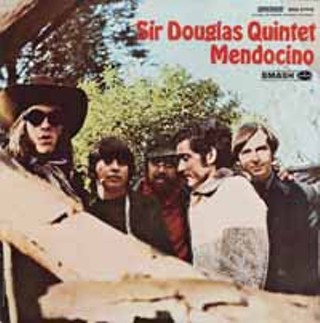
26. "Mendocino," Sir Douglas Quintet (#27, 1969)
Texas wasn't the best place to be a longhair in the Sixties, and for Doug Sahm, the last straw was a 1966 pot bust at the Corpus Christi airport. Sahm moved to San Francisco and started a new Sir Douglas Quintet, while signature organist Augie Meyers tarried in Texas. While the 1969 single "Mendocino" was a lyrical mash note to the hippie inhabitants of Northern California, the musical blend of rock, blues, country, and conjunto was pure West Side San Antonio.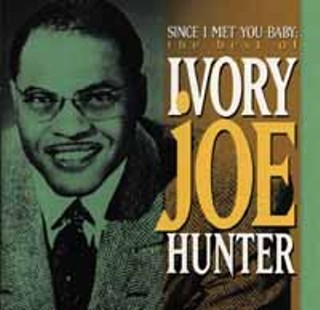
25. "Since I Met You Baby," Ivory Joe Hunter (#12, 1956)
By the time pianist/vocalist Ivory Joe Hunter (1914-1974) hit the pop charts with the elegant blues ballad "Since I Met You Baby," he'd already amassed a stable of R&B chart-toppers like 1948's "Pretty Mama Blues" and 1950's "I Almost Lost My Mind." Born in the small East Texas town of Kirbyville, Hunter played juke joints throughout the Gulf Coast region and even hosted a radio show in Beaumont before moving to California in 1942.24. "Rave On," Buddy Holly (#37, 1958)
Though not one of his bigger hits, Buddy Holly's rockin' rendition of Sonny West's "Rave On" remains a fan favorite on the strength of its rhythmic swagger, exaggerated hiccup vocal, and lascivious undertones. Here, Holly sounds less like the nice guy next door and more like a self-assured young stud with a flaming libido. In a morbid twist of coincidence, Rick Nelson ended his last concert on Dec. 30, 1985, with "Rave On." Nelson was killed in a plane crash near DeKalb, Texas, the next day.23. "Before the Next Teardrop Falls," Freddy Fender (#1, 1974)
Born Baldemar Huerta in San Benito, Texas, Freddy Fender was a popular rock & roller in the Valley during the Fifties until a 1960 bust for two joints landed him in Louisiana's Angola prison. Doug Sahm helped bring Fender out of obscurity in 1974, when producer Huey P. Meaux brought him to Houston and remolded him as a country-pop singer. "Before the Next Teardrop Falls," released on Meaux's Crazy Cajun label before being picked up by ABC-Dot, made Fender a star "overnight."22. "On the Road Again," Willie Nelson (#20, 1980)
Having established himself as Texas' musical ambassador, Willie Nelson turned his eye toward acting in the late Seventies, first with a supporting role in 1979's The Electric Horseman, then with a star turn in 1980's Honeysuckle Rose. Nelson played a road-hungry country troubadour caught up in a love triangle between Dyan Cannon and Amy Irving. While the movie was mildly entertaining, it did spawn a Nelson classic in "On the Road Again."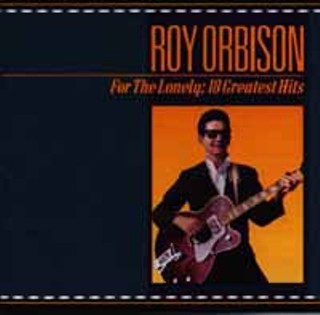
21. "Only the Lonely (Know How I Feel)," Roy Orbison (#2, 1960)
Born in Vernon and raised in Wink, Roy Orbison played all over West Texas with the Wink Westerners and later the Teen Kings before signing with Sam Phillips' Sun Records and scoring a minor rockabilly hit with "Ooby Dooby" in 1956. It was "Only the Lonely" that established Orbison as a singular vocal talent, his quavering, operatic voice lending emotive gravity to his heavily orchestrated songs of unrequited love, and "Only the Lonely" was the first of many to make the Top 40.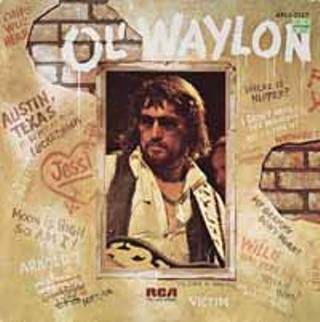
20. "Luckenbach, Texas (Back to the Basics of Love)," Waylon Jennings (#25, 1977)
Littlefield-born Waylon Jennings started his musical career playing bass for his mentor, Buddy Holly. In fact, Jennings was supposed to be on the ill-fated plane that went down in 1959, but he gave up his seat to J.P. "Big Bopper" Richardson at the last minute. Jennings went on to become an Outlaw Country icon, "Luckenbach, Texas" using the mythos surrounding Hondo Crouch's tiny town as a metaphor for reigniting a dying relationship. Jennings died earlier this year from diabetes-related complications.19. "Chantilly Lace," Big Bopper (#6, 1958)
Sabine Pass native J.P. Richardson became the "Big Bopper" while working as a deejay at KTRM in Beaumont. Originally released as the B-side to novelty single "Purple People Eater Meets the Witch Doctor," "Chantilly Lace" established Richardson as a performer. Richardson also wrote classics like George Jones' "White Lightning" and Johnny Preston's "Running Bear." Less than six months after "Chantilly Lace" peaked, Richardson was killed at age 28 in the same Iowa plane crash that killed Buddy Holly and Ritchie Valens.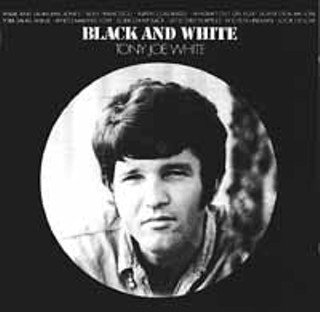
18. "Polk Salad Annie," Tony Joe White (#8, 1969)
We fully acknowledge that swamp-pop king Tony Joe White was "born (and raised) in Loosiana," not Texas. Nevertheless, he gigged extensively on both sides of the Sabine and eventually came to live and work out of Corpus Christi during the mid-Sixties. During one fortuitous week in the Sparkling City, he wrote both "Rainy Night in Georgia" and "Polk Salad Annie," the former a huge hit for Brook Benton, the latter a huge hit for White himself.17. "King of the Road," Roger Miller (#4, 1965)
Born in Fort Worth, Roger Miller (1936-1992) played drums for Ray Price and fiddle for Minnie Pearl before establishing himself as a successful songwriter in the late Fifties. After tempering country with a sense of novelty, Miller became a successful performer as well. "King of the Road" is a fun song, but Miller also imbues it with rich observations about characters, places, and old stogies.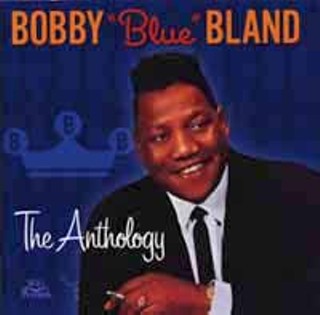
16. "Turn On Your Love Light," Bobby "Blue" Bland (#28, 1962)
Bobby "Blue" Bland got his start in Memphis with the Beale Streeters, a group that included B.B. King and Johnny Ace. Bland moved to Houston to record after WDIA disc jockey James Mattis sold Duke Records to Don Robey, the notoriously iron-fisted founder of Peacock Records. Bland became the label's biggest star thanks to his gospel-tinged R&B vocals and the fiery horn arrangements of trumpeter Joe Scott. The brassy, swinging "Turn On Your Love Light" captures late-night carousing to a T.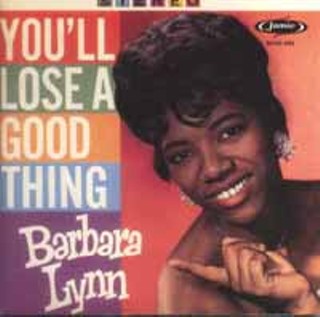
15. "You'll Lose a Good Thing," Barbara Lynn (#8, 1962)
As a performer, songwriter, and guitarist, Beaumont's Barbara Lynn was something of an anomaly in the early Sixties. Attending school by day while plying her craft in Golden Triangle area clubs by night, Lynn recorded her "You'll Lose a Good Thing" with Huey Meaux in New Orleans. The song's Crescent City-style R&B sounds like the sentiment of a much older woman than Lynn was at the time.14. "Crying," Roy Orbison (#2, 1961)
No song captures Roy Orbison's soaring vocal prowess and his gift for heart-wrenching despair better than "Crying." Orbison describes a man in the throes of full-blown grief, who plays it strong until a chance touch of his ex's hand. He's only able to realize the depths of his love when she's gone, and as the song builds to its climax, Orbison sustains a high note that approximates an uncontrollable sob. In some sense, "Crying" is about death rather than a mere parting of ways.13. "Treat Her Right," Roy Head and the Traits (#2, 1965)
If you look in the encyclopedia under "Southern-Fried Blue-Eyed Soul," you'll find a picture of Roy Head doing a back flip while belting out "Treat Her Right." Born in Three Rivers, Head made his name via incendiary shows throughout South and Central Texas. While the Big Bopper-style shout-outs and hot horn charts of "Treat Her Right" remain Head's calling card, he cut several decent-selling country sides during the Seventies. His 1997 Austin Music Awards performance filling in for Freddy Fender in the Texas Tornados proved the man still performs a mean back flip.12. "Hide Away," Freddy King (#29, 1961)
Born Freddie Christian in Gilmer, Texas, guitarist Freddy King (1934-1976) was a vital link between the first wave of Chicago electric blues guitarists like Muddy Waters and Jimmy Rogers, and the subsequent rise of rock guitar greats like Eric Clapton and Stevie Ray Vaughan. Named after Mel's Hide Away Bar in Chicago, "Hide Away" is one of the great blues instrumentals of all time. King's finger-and-thumb picking is butter smooth, yet the song retains plenty of jaunty playfulness, even quoting "Peter Gunn" for a measure.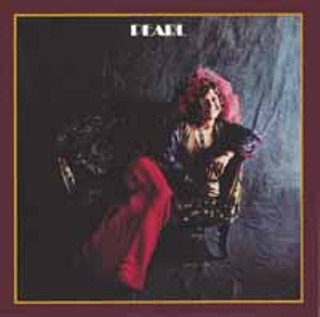
11. "Me and Bobby McGee," Janis Joplin (#1, 1971)
Of all the Texas musicians forced into exile during the Sixties, Port Arthur's Janis Joplin was the most popular and the most tragic. Though Joplin rose to fame on the screeching acrobatics of her "Ball and Chain" performance at the Monterey Pop Festival in 1967, the true depth of her talent is revealed on 1971's Pearl. Her vocal reading of Kris Kristofferson's "Me and Bobby McGee" shows passion and restraint in all the right places. Joplin died of a heroin overdose just four months before Pearl's release.10. "Oh Pretty Woman," Roy Orbison & the Candy Men (#1, 1964)
The immortal strutting bass line that opens "Oh Pretty Woman" conjures up images of a sleek, self-assured woman walking toward the daydreaming Orbison, the snare drum standing in for the rhythmic tat-tat-tat of her high heels against the concrete. "Is she walking back to me?" asks Orbison. "Yes! She's walking back to me!" After going through whatever romantic hell inspired "Crying," the man clearly deserved a break.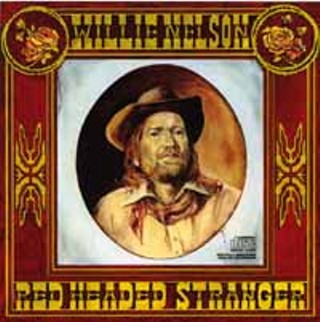
9. "Blue Eyes Crying in the Rain," Willie Nelson (#21, 1975)
Following the critical acclaim of Willie Nelson's two Atlantic albums, Shotgun Willie and Phases and Stages, 1975's Red Headed Stranger and its gorgeous rendition of the Acuff-Rose classic "Blue Eyes Crying in the Rain" became the critical and commercial pinnacle of Nelson's mid-Seventies output. His new label Columbia initially thought the song was a demo and balked at releasing it. However, Nelson's song cycle about a cuckolded preacher turned murderer became a huge seller with a formidable pop crossover single in "Blue Eyes."8. "Peggy Sue," Buddy Holly (#3, 1957)
Of all the songs recorded by Buddy Holly, "Peggy Sue" deserves the most credit for integrating nerds into rock & roll. And there really was a Peggy Sue! Crickets' drummer Jerry Allison had a crush on a Lubbock High School sophomore named Peggy Sue Gerron, and he persuaded Holly to change the name of the song from "Cindy Lou" just before it was recorded. It worked, too, because Allison and Gerron later married, resulting in the sequel, "Peggy Sue Got Married." They later divorced.7. "Wasted Days and Wasted Nights," Freddy Fender (#8, 1975)
Freddy Fender's trademark tune initially became a regional hit in 1959, artfully combining rockabilly, blues, and conjunto torch song sensibilities into a new genre that became known as Tex-Mex. In 1975, following the success of "Before the Next Teardrop Falls," a new, country-flavored recording of "Wasted Days and Wasted Nights" became Fender's second straight No. 1 hit on the country charts and a No. 8 hit on the pop charts.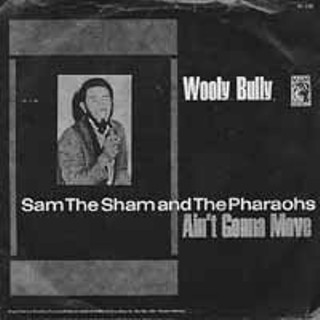
6. "Wooly Bully," Sam the Sham & the Pharaohs (#2, 1965)
Although Sam the Sham & the Pharaohs were firmly ensconced in Memphis by the time "Wooly Bully" hit, the group actually started in West Dallas in 1961. Moreover, the immortal count-off ("Uno, dos... one, two, tres, cuatro!") and the chugging organ of "Wooly Bully" are pure Tex-Mex devices. Despite worthy follow-ups like "Ring Dang Doo" and "Little Red Riding Hood," this fun-loving, turban-wearing band didn't have a chance once rock & roll became "art." Vocalist/organist Domingo "Sam" Samudio became a minister to inmates, but still plays the odd oldies show now and then.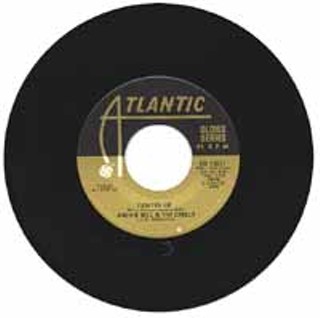
5. "Tighten Up," Archie Bell & the Drells (#1, 1968)
"Hi, everybody! I'm Archie Bell & the Drells from Houston, Texas. We don't only sing, but we dance just as good as we walk!" The Henderson, TX-born Bell sings only sparingly on "Tighten Up," instead instructing the Drells through the groovy motions of "tightening up." Shortly after KCOH deejay Skipper Lee Frazier recorded "Tighten Up," Bell was inducted into the Army and sent to Vietnam. After his discharge, Bell & the Drells recorded several more hits with Philadelphia soul masters Kenny Gamble and Leon Huff, but "Tighten Up" forever defined them as Houstonians.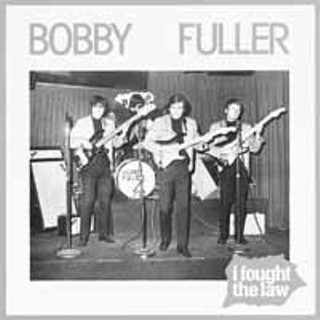
4. "I Fought the Law," Bobby Fuller Four (#9, 1966)
Written by former Cricket Sonny Curtis, "I Fought the Law" marked the culmination of a half-decade of intense wood shedding for the Bobby Fuller Four. Born in Goose Creek, Texas, a subdivision of Baytown, and raised in El Paso, Fuller originally released the song on his own Exeter label, on which it became a huge local hit in 1964. The band moved to L.A., and five months after the newly recorded Mustang Records' version of the song peaked on the charts in 1966, Fuller was found dead in his car. The coroner ruled his death suicide by inhalation of gasoline, but no one close to Fuller agreed with the ruling, and his death remains a mystery.3. "She's About a Mover," Sir Douglas Quintet (#13, 1965)
Maybe the rest of the world could be fooled by the name and the Carnaby duds, but no self-respecting Texan bought into producer Huey P. Meaux's fabrications regarding the Sir Douglas Quintet's British pedigree. "She's About a Mover" is a uniquely South Texas mix of rock, R&B, Cajun, and conjunto, punctuated by Augie Meyer's treble-laden Vox organ riff matching Doug Sahm's soulful, mid-song interpolation of "What'd I Say." We still miss ya, Doug.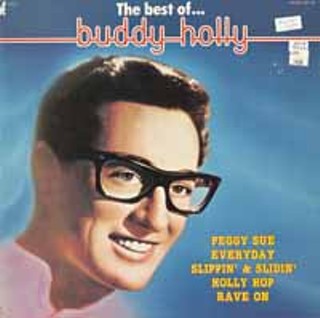
2. "That'll Be the Day," Buddy Holly & the Crickets (#1, 1957)
The song that made the Crickets into rock & roll stars was based on a phrase John Wayne uttered in The Searchers. According to lore, the day after seeing the movie at Lubbock's State Theater, Buddy Holly asked drummer Jerry Allison to write a song with him. Allison jokingly replied, "That'll be the day," and the rest is history. The song also established Holly as a member in the proud club of Texas musicians who found success upon returning home after unsuccessfully butting heads with Nashville.1. "96 Tears," ? & the Mysterians (#1, 1966)
Recorded (reportedly for $40) by sons of migrant workers born along the Texas-Mexico border, and raised in Saginaw, Mich., ? & the Mysterians' "96 Tears" is one of the most pathological songs ever to make the Top 10. Over an omnipresent bed of Tex-Mex Vox organ, Rudy Martinez (aka "Question Mark") sings about a woman "way on top" who is "always laughing way down" at him. Utilizing the most irrational-yet-common brand of scorned-man logic, he plots to get back with her for just long enough to make her as miserable as he is. The organ is what gives the song (originally it was 69 tears ...) its Lone Star flavor, but the angry break-up lyrics are what make it an enduring garage-punk classic.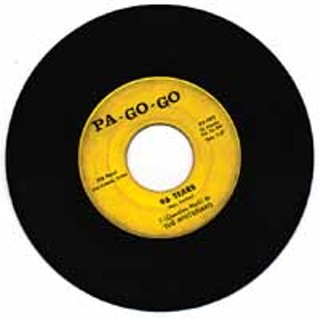
Top 40 radio and Texas go way back together. In 1955, Chuck Dunaway and Kent Burkhart initiated what's thought to be the very first radio station music survey at KXOL in Fort Worth. Although Omaha programmer Todd Storz is generally credited with actually codifying the Top 40 format based on his study of jukebox play patterns, Gordon McLendon's KLIF in Dallas was one of the format's earliest adapters and most influential adherents.
McLendon dubbed KLIF "America's Most Imitated Radio Station," and there was definitely some truth to the claim. Dallas-based PAMS Productions was the nation's leading maker of station ID jingles, and when programmers from around the country visited Dallas to work with PAMS, they heard KLIF and took notes. McLendon gradually homed in on a listener-driven music policy -- as opposed to just letting deejays pick records -- and assembled a stellar lineup of on-air talent, including Art Nelson, Don Keyes, Jimmy Rabbitt, and Russ "Weird Beard" Knight.
This resulted in KLIF becoming the No. 1 station in Dallas from the mid-Fifties through the early Seventies, a period generally thought of as the "Golden Age" of Top 40. McLendon's KILT in Houston and KTSA in San Antonio had similar success in their respective markets. In Austin, Wendell Mayes' KNOW was the prime Top 40 player at 1490 on the AM dial.
Top 40 AM stations began their gradual slide when listeners abandoned the AM band for the sonic clarity of FM stereo. In the Eighties, Top 40 evolved into "Contemporary Hit Radio," or CHR. While CHR maintains some of the personality-driven vibrancy of Top 40, rigid format segmentation and media consolidation have boxed it into a bland corner devoid of the big-tent musical variety and defining regionalisms that made Top 40 worth listening to.
Of course, Top 40 radio couldn't have succeeded without the galvanizing effect popular music had on American youth, beginning in the Fifties. And from Les Baxter to Destiny's Child, Texas-bred artists are a constant thread in that story. There have been hundreds of great -- and it must be said, not-so-great -- Top 40 hits out of Texas since 1955, even as "singles" have become an endangered species. Yet if you had to pick 40 of these hits, what would they be?
To answer that question, I asked the Chronicle's music staff and a number of music/media luminaries from Austin and around the country -- including two real, live Top 40 artists! -- to rank their 40 favorite Top 40 hits from Texas. Utilizing my rudimentary arithmetic skills, an overall ranking was then assigned each of the 213 songs that received a nod. The idea was to re-create the survey-driven, community consensus spirit projected -- if not necessarily practiced -- by early Top 40 radio.
For a song's possible inclusion into the Chronicle's Texas Top 40, two requirements had to be met: The song had to be a Top 40 hit on Billboard's "Hot 100" singles chart between 1955 and 2001, and the performing artist had to have a tenable connection to Texas.
Both criteria fomented dissent among the troops. The first meant that the 13th Floor Elevators' "You're Gonna Miss Me," surely one of the most beloved and influential songs ever to come out of Texas (see sidebar), wasn't eligible since it only made it to No. 55 in Billboard. The second requirement was even more contentious. What makes someone a Texas artist? Is it being born here? Playing music here? First achieving notoriety here? In the end, I left what constituted a "tenable connection" open to each chart-maker's interpretation.
Given this survey's long view of pop music, newer songs were at a disadvantage against time-tested classics. The age range of the people surveyed (twentysomethings through sixtysomethings) also contributed to this. As a result, the newest song that made the Texas Top 40 is already 11 years old. If this survey were taken again in 10 years, however, when today's 11-year-old is 21, "Bootylicious" would likely be up in there somewhere.
These are the eternal foibles of trying to quantify works of art against one another. No matter how much you know, or how much you try to seek consensus, there's always room for argument. Ultimately, provoking a spirited argument with an exercise like this is its own special reward. If nothing else, let this be a yardstick by which we can all disagree.
But enough of my yappin'. Let's start this week's countdown. Coming in at No. 40, it's that Little Ol' Band From Texas ... .
Special thanks to Mike Buck and Antone's Records for use of their fabulous archives. Thanks also to Martin Coulter of Waterloo Records for additional record wrangling.
POLL RANKING / SONG TITLE / ARTIST / HIGHEST CHART POSITION / YEAR CHARTED
1 / "96 Tears" / ? & the Mysterians / 1 / 1966
2 / "That'll Be the Day" / Buddy Holly & the Crickets / 1 / 1957
3 / "She's About a Mover" / Sir Douglas Quintet / 13 / 1965
4 / "I Fought the Law" / Bobby Fuller Four / 9 / 1966
5 / "Tighten Up" / Archie Bell & the Drells / 1 / 1968
6 / "Wooly Bully" / Sam the Sham & the Pharaohs / 2 / 1965
7 / "Wasted Days and Wasted Nights" / Freddy Fender / 8 / 1975
8 / "Peggy Sue" / Buddy Holly / 3 / 1957
9 / "Blue Eyes Crying in the Rain" / Willie Nelson / 21 / 1975
10 / "Oh Pretty Woman" / Roy Orbison & the Candy Men / 1 / 1964
11 / "Me and Bobby McGee" / Janis Joplin / 1 / 1971
12 / "Hide Away" / Freddy King / 29 / 1961
13 / "Treat Her Right" / Roy Head & the Traits / 2 / 1965
14 / "Crying" / Roy Orbison / 2 / 1961
15 / "You'll Lose a Good Thing" / Barbara Lynn / 8 / 1962
16 / "Turn on Your Love Light" / Bobby "Blue" Bland / 28 / 1962
17 / "King of the Road" / Roger Miller / 4 / 1965
18 / "Polk Salad Annie" / Tony Joe White / 8 / 1969
19 / "Chantilly Lace" / Big Bopper / 6 / 1958
20 / "Luckenbach, Texas" / Waylon Jennings / 25 / 1977
21 / "Only the Lonely (Know How I Feel)" / Roy Orbison / 2 / 1960
22 / "On the Road Again" / Willie Nelson / 20 / 1980
23 / "Before the Next Teardrop Falls" / Freddy Fender / 1 / 1975
24 / "Rave On" / Buddy Holly / 37 / 1958
25 / "Since I Met You Baby" / Ivory Joe Hunter / 12 / 1956
26 / "Mendocino" / Sir Douglas Quintet / 27 / 1969
27 / "Tuff Enuff" / Fabulous Thunderbirds / 10 / 1986
28 / "Hey Baby" / Bruce Channel / 1 / 1962
29 / "Hot Smoke & Sasafrass" / Bubble Puppy / 14 / 1969
30 / "Drift Away" / Dobie Gray / 5 / 1973
31 / "Mind Playing Tricks on Me" / Geto Boys / 23 / 1991
32 / "For the Good Times" / Ray Price / 11 / 1970
33 / "I Can See Clearly Now" / Johnny Nash / 1 / 1972
34 / "Talk to Me" / Sunny & the Sunglows / 11 / 1963
35 / "The Joker" / Steve Miller Band / 1 / 1973
36 / "The Future's So Bright, I Gotta Wear Shades" / Timbuk 3 / 19 / 1986
37 / "Party Doll" / Buddy Knox with the Rhythm Orchids / 1 / 1957
38 / "Lowdown" / Boz Scaggs / 3 / 1976
39 / "The Gambler" / Kenny Rogers / 16 / 1978
40 / "Tush" / ZZ Top / 20 / 1975
The Chart-Makers
Greg Beets: Contributor, The Austin Chronicle
Kent Benjamin: Features Editor, Pop Culture Press
Bill Bentley: Senior Vice-President of Media Relations, Warner Bros. Records
Michael Bertin: Contributor, The Austin Chronicle
Michael Chamy: Associate Music Editor, The Austin Chronicle
King Coffey: Drummer, Butthole Surfers -- Top 40 artist with "Pepper" (#26, 1996)
Christopher Coletti: Contributor, The Austin Chronicle
Jody Denberg: Program Director, KGSR
Ben Fong-Torres: Author, The Hits Just Keep On Coming: The History of Top 40 Radio
David Fricke: Senior Editor, Rolling Stone
Christopher Gray: Contributor, The Austin Chronicle
Michael Hall: Senior Editor, Texas Monthly
Raoul Hernandez: Music Editor, The Austin Chronicle
Terry Lickona: Producer, Austin City Limits
Ken Lieck: Contributing Writer, The Austin Chronicle
David Lynch: Contributor, The Austin Chronicle
Dave Marsh: Author, The Heart of Rock & Soul: The 1,001 Greatest Singles Ever Made
Casey Monahan: Director, Texas Music Office
Margaret Moser: Staff Writer, The Austin Chronicle
Joe Nick Patoski: Senior Editor, Texas Monthly
Paul Ray: Host, Twine Time and Paul Ray's Jazz, KUT
Tony Scalzo: Bassist/Vocalist, Fastball -- Top 40 artist with "The Way" (#5, 1998) and "Out of My Head" (#20, 1999)
Jay Trachtenberg: Air Staff Manager and Host of Jazz, Etc., KUT; Contributor, The Austin Chronicle
Ben Fong-Torres returned to Oakland after a year, stayed tuned to the radio, and eventually became both an editor at Rolling Stone and a weekend deejay on KSAN, the free-form FM rock pioneer.
"On & On," Erykah Badu (#12, 1997)
"Bag Lady" Erykah Badu (#6, 2000)
"Lost Love," H.B. Barnum (#35, 1961)
"Tighten Up," Archie Bell & the Drells (#1, 1968)
"I Can't Stop Dancing," Archie Bell & the Drells (#9, 1968)
"There's Gonna Be a Showdown," Archie Bell & the Drells (#21, 1969)
"Unchained Melody," Les Baxter, His Chorus & Orchestra (#1, 1955)
"Wake the Town and Tell the People," Les Baxter, his Chorus & Orchestra (#5, 1955)
"The Poor People of Paris," Les Baxter, his Chorus & Orchestra (#1, 1956)
"Guess Who," Jesse Belvin (#31, 1959)
"Chantilly Lace," Big Bopper (#6, 1958)
"Big Bopper's Wedding," Big Bopper (#38, 1958)
"Percolator (Twist)," Billy Joe & the Checkmates (#10, 1962)
"When I Said I Do," Clint Black w," Lisa Hartman Black (#31, 1999)
"Turn On Your Love Light," Bobby "Blue" Bland (#28, 1962)
"Call On Me," Bobby "Blue" Bland (#22, 1963)
"That's the Way Love Is," Bobby "Blue" Bland (#33, 1963)
"Ain't Nothing You Can Do," Bobby "Blue" Bland (#20, 1964)
"D.O.A.," Bloodrock (#36, 1971)
"I'm Stickin' With You," Jimmy Bowen With the Rhythm Orchids (#14, 1957)
"What I Am," Edie Brickell & the New Bohemians (#7, 1989)
"Mission Bell," Donnie Brooks (#7, 1960) "Doll House," Donnie Brooks (#31, 1960)
"Hot Smoke & Sasafrass," Bubble Puppy (#14, 1969)
"Pepper," Butthole Surfers (#26, 1996)
"Round and Round," Tevin Campbell (#12, 1991)
"Tell Me What You Want Me to Do," Tevin Campbell (#6, 1991)
"Can We Talk," Tevin Campbell (#9, 1993)
"I'm Ready," Tevin Campbell (#9, 1993)
"Always in My Heart," Tevin Campbell (#20, 1994)
"Judy Mae," Boomer Castleman (#33, 1975)
"Hey Baby," Bruce Channel (#1, 1962)
"Band of Gold," Don Cherry (#4, 1955)
"Wild Cherry," Don Cherry (#29, 1956)
"Ghost Town," Don Cherry (#22, 1956)
"I Don't Want to Miss a Thing," Mark Chesnutt (#17, 1999)
"I Want You, I Need You," Chris Christian (#37, 1981)
"Sugar On Sunday," the Clique (#22, 1969)
"Sunny Came Home," Shawn Colvin (#7, 1997)
"Pledge of Love," Ken Copeland (#12, 1957)
"Ride Like the Wind," Christopher Cross (#2, 1980)
"Sailing," Christopher Cross (#1, 1980)
"Never Be the Same," Christopher Cross (#15, 1980)
"Say You'll Be Mine," Christopher Cross (#20, 1981)
"Arthur's Theme (Best That You Can Do)," Christopher Cross (#1, 1981)
"All Right," Christopher Cross (#12, 1983)
"No Time for Talk," Christopher Cross (#33, 1983)
"Think of Laura," Christopher Cross (#9, 1983)
"Ashes by Now," Rodney Crowell (#37, 1980)
"Street Life," The Crusaders (#36, 1979)
"I'll Save the Last Dance for You," Damita Jo (#22, 1960)
"I'll Be There," Damita Jo (#12, 1961)
"Baby Don't Get Hooked on Me," Mac Davis (#1, 1972)
"One Hell of a Woman," Mac Davis (#11, 1974)
"Stop and Smell the Roses," Mac Davis (#9, 1974)
"Rock N' Roll (I Gave You the Best Years of My Life)," Mac Davis (#15, 1974)
"Rockin' Robin'," Bobby Day (#2, 1958)
"Little Sandy Sleighfoot," Jimmy Dean (#32, 1958)
"Big Bad John," Jimmy Dean (#1, 1961)
"The Cajun Queen," Jimmy Dean (#22, 1961)
"Dear Ivan," Jimmy Dean (#24, 1962)
"To a Sleeping Beauty," Jimmy Dean (#26, 1962)
"P.T. 109," Jimmy Dean (#8, 1962)
"Little Black Book," Jimmy Dean (#29, 1962)
"I.O.U.," Jimmy Dean (#35, 1976)
"Breakfast at Tiffany's," Deep Blue Something (#5, 1995)
"No, No, No," Destiny's Child (#3, 1997)
"Bills, Bills, Bills," Destiny's Child (#1, 1999)
"Bug a Boo," Destiny's Child (#33, 1999)
"Say My Name," Destiny's Child (#1, 2000)
"Jumpin, Jumpin," Destiny's Child (#3, 2000)
"Independent Woman Pt. 1," Destiny's Child (#1, 2000)
"Survivor," Destiny's Child (#2, 2001)
"Bootylicious," Destiny's Child (#1, 2001)
"Emotion," Destiny's Child (#23, 2001)
"There's Your Trouble," Dixie Chicks (#36, 1998)
"You Were Mine," Dixie Chicks (#34, 1999)
"Ready to Run," Dixie Chicks (#39, 1999)
"Cowboy Take Me Away," Dixie Chicks (#27, 2000)
"Goodbye Earl," Dixie Chicks (#19, 2000)
"Without You," Dixie Chicks (#31, 2000)
"If I Fall You're Going Down With Me," Dixie Chicks (#38, 2001)
"I'd Really Love to See You Tonight," England Dan & John Ford Coley (#2, 1976)
"Nights Are Forever Without You," England Dan & John Ford Coley (#10, 1976)
"It's Sad to Belong," England Dan & John Ford Coley (#21, 1977)
"Gone Too Far," England Dan & John Ford Coley (#23, 1977)
"We'll Never Have to Say Goodbye Again," England Dan & John Ford Coley (#9, 1978)
"Love Is the Answer," England Dan & John Ford Coley (#10, 1979)
"Tuff Enuff," Fabulous Thunderbirds (#10, 1986)
"The Way," Fastball (#5, 1998)
"Out of My Head," Fastball (#20, 1999)
"Before the Next Teardrop Falls," Freddy Fender (#1, 1975)
"Wasted Days and Wasted Nights," Freddy Fender (#8, 1975)
"Secret Love," Freddy Fender (#20, 1975)
"You'll Lose a Good Thing," Freddy Fender (#32, 1976)
"In the Mood," Ernie Fields Orchestra (#4, 1959)
"I See the Light," Five Americans (#26, 1966)
"Western Union," Five Americans (#5, 1967)
"Sound of Love," Five Americans (#36, 1967)
"Zip Code," Five Americans (#36, 1967)
"I Fought the Law," Bobby Fuller Four (#9, 1966)
"Love's Made a Fool of You," Bobby Fuller Four (#26, 1966)
"Mind Playing Tricks on Me," Geto Boys (#23, 1991)
"Six Feet Deep," Geto Boys (#40, 1993)
"Stand by Me," Mickey Gilley (#22, 1980)
"Your Love," Larry Graham and Graham Central Station (#38, 1975)
"One in a Million You," Larry Graham (#9, 1980)
"The 'In' Crowd," Dobie Gray (#13, 1965)
"Drift Away," Dobie Gray (#5, 1973)
"You Can Do It," Dobie Gray (#37, 1979)
"Junk Food Junkie," Larry Groce (#9, 1976)
"Treat Her Right," Roy Head and the Traits (#2, 1965)
"Just a Little Bit," Roy Head (#39, 1965)
"Apple of My Eye," Roy Head and the Traits (#32, 1965)
"Dirty Laundry," Don Henley (#3, 1982)
"The Boys of Summer," Don Henley (#5, 1984)
"All She Wants to Do Is Dance," Don Henley (#5, 1984)
"Not Enough Love in the World," Don Henley (#34, 1985)
"Sunset Grill," Don Henley (#22, 1985)
"The End of the Innocence," Don Henley (#8, 1989)
"The Last Worthless Evening," Don Henley (#21, 1989)
"The Heart of the Matter," Don Henley (#21, 1990)
"I Like the Way (the Kissing Game)," Hi-Five (#1, 1991)
"I Can't Wait Another Minute," Hi-Five (#8, 1991)
"She's Playing Hard to Get," Hi-Five (#5, 1992)
"Quality Time," Hi-Five (#38, 1993)
"Never Should've Let You Go," Hi-Five (#30, 1993)
"And I Am Telling You I'm Not Going," Jennifer Holliday (#22, 1982)
"That'll Be the Day," Buddy Holly & the Crickets (#1, 1957)
"Peggy Sue," Buddy Holly (#3, 1957)
"Oh, Boy!," Buddy Holly & the Crickets (#10, 1957)
"Maybe Baby," Buddy Holly & the Crickets (#17, 1958)
"Rave On," Buddy Holly (#37, 1958)
"Think it Over," Buddy Holly (#27, 1958)
"Early in the Morning," Buddy Holly (#32, 1958)
"It Doesn't Matter Anymore," Buddy Holly (#13, 1959)
"The Battle of New Orleans," Johnny Horton (#1, 1959)
"Sink the Bismarck," Johnny Horton (#3, 1960)
"North to Alaska," Johnny Horton (#4, 1960)
"Knockin' Da Boots," H-Town (#3, 1993)
"A Thin Line Between Love and Hate," H-Town (#37, 1996)
"They Like It Slow," H-Town (#35, 1997)
"Since I Met You Baby," Ivory Joe Hunter (#12, 1956)
"Get Gone," Ideal (#13, 1999)
"Good Hearted Woman," Waylon Jennings & Willie Nelson (#25, 1976)
"Luckenbach, Texas (Back to the Basics of Love)," Waylon Jennings (#25, 1977)
"Theme From the Dukes Of Hazzard (Good Ol' Boys)," Waylon Jennings (#21, 1980)
"Me and Bobby McGee," Janis Joplin (#1, 1971)
"Save Some Love," Keedy (#15, 1991)
"Hide Away," Freddy King (#29, 1961)
"Soul Twist," King Curtis and the Noble Knights (#17, 1962)
"Memphis Soul Stew," King Curtis (#33, 1967)
"Ode to Billy Joe," King Curtis and The Kingpins (#28, 1967)
"Party Doll," Buddy Knox with the Rhythm Orchids (#1, 1957)
"Rock Your Little Baby to Sleep," Buddy Knox with the Rhythm Orchids (#17, 1957)
"Hula Love," Buddy Knox with the Rhythm Orchids (#7, 1957)
"Somebody Touched Me," Buddy Knox with the Rhythm Orchids (#22, 1958)
"Lovey Dovey," Buddy Knox (#25, 1961)
"Loving Her Was Easier (Than Anything I'll Ever Do Again)," Kris Kristofferson (#26, 1971)
"Why Me," Kris Kristofferson (#16, 1973)
"Lookin' for Love," Johnny Lee (#5, 1980)
"Whatcha Gone Do?," Link (#23, 1998)
"I Don't Wanna See," Link (#25, 1999)
"Stay (I Missed You)," Lisa Loeb & Nine Stories (#1, 1994)
"Do You Sleep?," Lisa Loeb & Nine Stories (#18, 1995)
"I Do," Lisa Loeb (#17, 1997)
"Let's Talk About Living," Bob Luman (#7, 1960)
" (If Loving You Is Wrong) I Don't Want to Be Right," Barbara Mandrell (#31, 1979)
"King Tut," Steve Martin and the Toot Uncommons (#17, 1978)
"Giving It Up for Your Love," Delbert McClinton (#8, 1980)
"Two Out of Three Ain't Bad," Meat Loaf (#11, 1978)
"Paradise by the Dashboard Light," Meat Loaf (#39, 1978)
"You Took the Words Right Out of My Mouth," Meat Loaf (#39, 1979)
"I'd Do Anything for Love (But I Won't Do That)," Meat Loaf (#1, 1993)
"Rock and Roll Dreams Come Through," Meat Loaf (#13, 1994)
"Objects in the Rear View Mirror May Appear Closer Than They Are," Meat Loaf (#38, 1994)
"I'd Lie For You (And That's the Truth)," Meat Loaf (#13, 1995)
"Dang Me," Roger Miller (#7, 1964)
"Chug-A-Lug," Roger Miller (#9, 1964)
"Do-Wacka-Do," Roger Miller (#31, 1965)
"King of the Road," Roger Miller (#4, 1965)
"Engine Engine #9," Roger Miller (#7, 1965)
"One Dyin' and a Buryin'," Roger Miller (#34, 1965)
"Kansas City Star," Roger Miller (#31, 1965)
"England Swings," Roger Miller (#8, 1965)
"Husbands and Wives," Roger Miller (#26, 1966)
"You Can't Roller Skate in a Buffalo Herd (#40, 1966)
"Walkin' in the Sunshine," Roger Miller (#37, 1967)
"Little Green Apples," Roger Miller (#39, 1968)
"The Joker," Steve Miller Band (#1, 1973)
"Take the Money and Run," Steve Miller (#11, 1976)
"Rock 'n Me," Steve Miller (#1, 1976)
"Fly Like an Eagle," Steve Miller (#2, 1977)
"Jet Airliner," Steve Miller Band (#8, 1977)
"Jungle Love," Steve Miller Band (#23, 1977)
"Swingtown," Steve Miller Band (#17, 1977)
"Heart Like a Wheel," Steve Miller Band (#24, 1981)
"Abracadabra," Steve Miller Band (#1, 1982)
"Geronimo's Cadillac," Michael Murphey (#37, 1972)
"Wildfire," Michael Murphey (#3, 1975)
"Carolina in the Pines," Michael Murphey (#21, 1975)
"Renegade," Michael Murphey (#39, 1976)
"What's Forever For," Michael Murphey (#19, 1982)
"A Very Special Love," Johnny Nash (#23, 1958)
"Hold Me Tight," Johnny Nash (#5, 1968)
"Cupid," Johnny Nash (#39, 1970)
"I Can See Clearly Now," Johnny Nash (#1, 1972)
"Stir It Up," Johnny Nash (#12, 1973)
"Blue Eyes Crying in the Rain," Willie Nelson (#21, 1975)
"On the Road Again," Willie Nelson (#20, 1980)
"Always on My Mind," Willie Nelson (#5, 1982)
"Let It Be Me," Willie Nelson (#40, 1982)
"To All the Girls I've Loved Before," Willie Nelson & Julio Iglesias (#5, 1984)
"Joanne," Michael Nesmith & the First National Band (#21, 1970)
"An American Trilogy," Mickey Newbury (#26, 1971)
"Only the Lonely (Know How I Feel)," Roy Orbison (#2, 1960)
"Blue Angel," Roy Orbison (#9, 1960)
"I'm Hurtin'," Roy Orbison (#27, 1960)
"Running Scared," Roy Orbison (#1, 1961)
"Crying," Roy Orbison (#2, 1961)
"Candy Man," Roy Orbison (#25, 1961)
"Dream Baby (How Long Must I Dream)," Roy Orbison (#4, 1962)
"The Crowd," Roy Orbison (#26, 1962)
"Workin' for the Man," Roy Orbison (#33, 1962)
"In Dreams," Roy Orbison (#7, 1963)
"Falling," Roy Orbison (#22, 1963)
"Mean Woman Blues," Roy Orbison (#5, 1963)
"Blue Bayou," Roy Orbison (#29, 1963)
"Pretty Paper," Roy Orbison (#15, 1963)
"It's Over," Roy Orbison (#9, 1964)
"Oh, Pretty Woman," Roy Orbison And The Candy Men (#1, 1964)
"Goodnight," Roy Orbison (#21, 1964)
" (Say) You're My Girl," Roy Orbison (#39, 1965)
"Ride Away," Roy Orbison (#25, 1965)
"Breakin' Up Is Breakin' My Heart," Roy Orbison (#31, 1966)
"Twinkle Toes," Roy Orbison (#39, 1966)
"You Got It," Roy Orbison (#9, 1989)
"I've Got a Tiger by the Tail," Buck Owens (#25, 1965)
"Ballad of Davy Crockett," Fess Parker (#5, 1955)
"Wringle Wrangle," Fess Parker (#12, 1957)
"Hey Paula," Paul & Paula (#1, 1963)
"Young Lovers," Paul & Paula (#6, 1963)
"First Quarrel," Paul & Paula (#27, 1963)
"The Wonder of You," Ray Peterson (#25, 1959)
"Tell Laura I Love Her," Ray Peterson (#7, 1960)
"Corinna, Corinna," Ray Peterson (#9, 1960)
"Missing You," Ray Peterson (#29, 1961)
"Nicole," Point Blank (#39, 1981)
"I Can Make It With You," Pozo-Seco Singers (#32, 1966)
"Look What You've Done," Pozo-Seco Singers (#32, 1967)
"Running Bear," Johnny Preston (#1, 1959)
"Cradle of Love," Johnny Preston (#7, 1960)
"Feel So Fine," Johnny Preston (#14, 1960)
"For the Good Times," Ray Price (#11, 1970)
"Kiss an Angel Good Morning," Charley Pride (#21, 1971)
"96 Tears," ? and the Mysterians (#1, 1966)
"I Need Somebody," ? and the Mysterians (#22, 1966)
"Four Walls," Jim Reeves (#11, 1957)
"He'll Have to Go," Jim Reeves (#2, 1960)
"I'm Gettin' Better," Jim Reeves (#37, 1960)
"Am I Losing You," Jim Reeves (#31, 1960)
"Lo Mucho Que Te Quiero," Rene Y Rene (#14, 1968)
"Tammy," Debbie Reynolds (#1, 1957)
"A Very Special Love," Debbie Reynolds (#20, 1958)
"Am I That Easy to Forget," Debbie Reynolds (#25, 1960)
"Harper Valley P.T.A.," Jeannie C. Riley (#1, 1968)
"Blue," LeAnn Rimes (#26, 1996)
"How Do I Live," LeAnn Rimes (#2, 1997)
"You Light Up My Life," LeAnn Rimes (#34, 1997)
"Looking Through Your Eyes," LeAnn Rimes (#18, 1998)
"Big Deal," LeAnn Rimes (#23, 1999)
"I Need You," LeAnn Rimes (#11, 2000)
"The Wayward Wind," Tex Ritter (#28, 1956)
"I Dreamed of a Hill-Billy Heaven," Tex Ritter (#20, 1961)
"Just Dropped In (To See What Condition My Condition Was In)," Kenny Rogers and the First Edition (#5, 1968)
"But You Know I Love You," Kenny Rogers and the First Edition (#19, 1968)
"Ruby, Don't Take Your Love to Town," Kenny Rogers and the First Edition (#6, 1969)
"Reuben James," Kenny Rogers and the First Edition (#26, 1969)
"Something's Burning," Kenny Rogers and the First Edition (#11, 1970)
"Tell It All Brother," Kenny Rogers and the First Edition (#17, 1970) "Heed the Call," Kenny Rogers and the First Edition (#33, 1970)
"Lucille," Kenny Rogers (#5, 1977)
"Daytime Friends," Kenny Rogers (#28, 1977)
"Love or Something Like It," Kenny Rogers (#32, 1977)
"The Gambler," Kenny Rogers (#16, 1978)
"She Believes in Me," Kenny Rogers (#5, 1979)
"You Decorated My Life," Kenny Rogers (#7, 1979)
"Coward of the County," Kenny Rogers (#3, 1979)
"Don't Fall in Love With a Dreamer," Kenny Rogers w/ Kim Carnes (#4, 1980)
"Love the World Away," Kenny Rogers (#14, 1980)
"Lady," Kenny Rogers (#1, 1980)
"I Don't Need You," Kenny Rogers (#3, 1980)
"Share Your Love With Me," Kenny Rogers (#14, 1981)
"Through the Years," Kenny Rogers (#13, 1982)
"Love Will Turn You Around," Kenny Rogers (#13, 1982)
"We've Got Tonight," Kenny Rogers w/ Sheena Easton (#6, 1983)
"All My Life," Kenny Rogers (#27, 1983)
"Islands in the Stream," Kenny Rogers w/ Dolly Parton (#1, 1983)
"This Woman," Kenny Rogers (#23, 1984)
"What About Me?" Kenny Rogers w/ Kim Carnes and James Ingram (#15, 1984)
"Buy Me a Rose," Kenny Rogers w/ Alison Krauss and Billy Dean (#40, 2000)
"Wooly Bully," Sam the Sham and the Pharaohs (#2, 1965)
"Ju Ju Hand," Sam the Sham and the Pharaohs (#26, 1965)
"Ring Dang Doo," Sam the Sham and the Pharaohs (#33, 1965)
"Lil Red Riding Hood," Sam the Sham and the Pharaohs (#2, 1966)
"The Hair on My Chinny Chin Chin," Sam the Sham and the Pharaohs (#22, 1966)
"How Do You Catch a Girl," Sam the Sham and the Pharaohs (#27, 1967)
"It's Over," Boz Scaggs (#38, 1976)
"Lowdown," Boz Scaggs (#3, 1976)
"Lido Shuffle," Boz Scaggs (#11, 1977)
"Breakdown Dead Ahead," Boz Scaggs (#15, 1980)
"JoJo," Boz Scaggs (#17, 1980)
"Look What You've Done to Me," Boz Scaggs (#14, 1980)
"Miss Sun," Boz Scaggs (#14, 1980)
"Heart of Mine," Boz Scaggs (#35, 1988)
"I Never Seen a Man Cry (Until I Seen a Man Die)," Scarface (#37, 1994)
"Smile," Scarface w/ 2Pac & Johnny P (#12, 1997)
"Summer Breeze," Seals & Crofts (#6, 1972)
"Hummingbird," Seals & Crofts (#20, 1973)
"Diamond Girl," Seals & Crofts (#6, 1972)
"We May Never Pass This Way Again," Seals & Crofts (#21, 1973)
"I'll Play for You," Seals & Crofts (#18, 1975)
"Get Closer," Seals & Crofts (#6, 1976)
"My Fair Share," Seals & Crofts (#28, 1977)
"You're the Love," Seals & Crofts (#18, 1978)
"I Could Fall in Love," Selena (#8, 1995)
"Dreaming of You," Selena (#22, 1995)
"Beat's So Lonely," Charlie Sexton (#17, 1986)
"She's About a Mover," Sir Douglas Quintet (#13, 1965)
"The Rains Came," Sir Douglas Quintet (#31, 1966)
"Mendocino," Sir Douglas Quintet (#27, 1969)
"I Wanna Love You Forever," Jessica Simpson (#3, 1999)
"I Think I'm in Love With You," Jessica Simpson (#21, 2000)
"Irresistable," Jessica Simpson (#15, 2001)
"Kiss Me," Sixpence None the Richer (#2, 1999)
"There She Goes," Sixpence None the Richer (#32, 1999)
"Dance to the Music," Sly and the Family Stone (#8, 1968)
"Everyday People," Sly and the Family Stone (#1, 1969)
"Stand!" Sly and the Family Stone (#22, 1969)
"Hot Fun In the Summertime," Sly and the Family Stone (#2, 1969)
"Thank You (Falettinme Be Mice Elf Agin)," Sly and the Family Stone (#1, 1970)
"I Want to Take You Higher," Sly and the Family Stone (#38, 1970)
"Family Affair," Sly and the Family Stone (#1, 1971)
"Runnin' Away," Sly and the Family Stone (#23, 1972)
"If You Want Me to Stay," Sly and the Family Stone (#12, 1973)
"Time for Livin'," Sly and the Family Stone (#32, 1974)
"You're Only Lonely," J.D. Souther (#7, 1979)
"Suspicion," Terry Stafford (#3, 1964)
"I'll Touch a Star," Terry Stafford (#25, 1964)
"Good and Lonesome," Kay Starr (#17, 1955)
"Rock and Roll Waltz," Kay Starr (#1, 1956)
"Second Fiddle," Kay Starr (#40, 1956)
"My Heart Reminds Me," Kay Starr (#9, 1957)
"My Maria," B.W. Stevenson (#9, 1973)
"Love the One You're With," Stephen Stills (#14, 1970)
"Sit Yourself Down," Stephen Stills (#37, 1971)
"I Hear You Knocking," Gale Storm (#2, 1955)
"Teenage Prayer," Gale Storm (#6, 1955)
"Memories Are Made of This," Gale Storm (#5, 1955)
"Why Do Fools Fall in Love," Gale Storm (#9, 1956)
"Ivory Tower," Gale Storm (#6, 1956)
"Dark Moon," Gale Storm (#4, 1957)
"Meanwhile," George Strait (#38, 1999)
"Write This Down," George Strait (#27, 1999)
"The Best Day," George Strait (#31, 2000)
"Go On," George Strait (#40, 2000)
"Talk to Me," Sunny & The Sunglows (#11, 1963)
"She's Like the Wind," Patrick Swayze (#3, 1988)
"Hold What You've Got," Joe Tex (#5, 1965)
"I Want To (Do Everything for You)," Joe Tex (#23, 1965)
"A Sweet Woman Like You," Joe Tex (#29, 1966)
"S.Y.S.L.J.F.M. (The Letter Song)," Joe Tex (#39, 1966)
"Show Me," Joe Tex (#35, 1967)
"Skinny Legs and All," Joe Tex (#10, 1967)
"Men are Gettin' Scarce," Joe Tex (#33, 1968)
"I Gotcha," Joe Tex (#2, 1972)
"Ain't Gonna Bump No More (With No Big Fat Woman)," Joe Tex (#12, 1977)
"I'm So Lonesome I Could Cry," B.J. Thomas and the Triumphs (#8, 1966)
"Mama," B.J. Thomas (#22, 1966)
"Billy and Sue," B.J. Thomas and the Triumphs (#34, 1966)
"The Eyes of a New York Woman," B.J. Thomas (#28, 1968)
"Hooked on a Feeling," B.J. Thomas (#5, 1968)
"Raindrops Keep Fallin' On My Head," B.J. Thomas (#1, 1969)
"Everybody's Out of Town," B.J. Thomas (#26, 1970)
"I Just Can't Help Believing," B.J. Thomas (#9, 1970)
"Most of All," B.J. Thomas (#38, 1971)
"No Love at All," B.J. Thomas (#16, 1971)
"Mighty Clouds of Joy," B.J. Thomas (#34, 1971)
"Rock and Roll Lullaby," B.J. Thomas (#15, 1972)
"(Hey Won't You Play) Another Somebody Done Somebody Wrong Song," B.J. Thomas (#1, 1975)
"Don't Worry Baby," B.J. Thomas (#17, 1977)
"The Future's So Bright, I Gotta Wear Shades," Timbuk 3 (#19, 1986)
"Possum Kingdom," Toadies (#40, 1995)
"My Angel Baby," Toby Beau (#13, 1978)
"Pledge of Love," Mitchell Torok (#25, 1957)
"Caribbean," Mitchell Torok (#27, 1959)
"Lizzie and the Rainman," Tanya Tucker (#37, 1975)
"The Little Space Girl," Jesse Lee Turner (#20, 1959)
"Ice Ice Baby," Vanilla Ice (#1, 1990)
"Play That Funky Music," Vanilla Ice (#4, 1990)
"Tonight (Could Be the Night)," The Velvets (#26, 1961)
"Take Time," Chris Walker (#29, 1992)
"The Chain of Love," Clay Walker (#40, 2000)
"I'm Gonna Love You Just a Little More Baby," Barry White (#3, 1973)
"I've Got So Much To Give," Barry White (#32, 1973)
"Never, Never Gonna Give You Up," Barry White (#7, 1973)
"Can't Get Enough of Your Love, Babe," Barry White (#1, 1974)
"You're the First, the Last, My Everything," Barry White (#2, 1974)
"What Am I Gonna Do With You," Barry White (#8, 1975)
"Let the Music Play," Barry White (#32, 1976)
"It's Ecstasy When You Lay Down Next to Me," Barry White (#4, 1977)
"Oh What a Night for Dancing," Barry White (#24, 1978)
"Practice What You Preach," Barry White (#18, 1994)
"Staying Power," Barry White (#40, 1999)
"I'm Gonna Sit Right Down and Write Myself a Letter," Billy Williams (#3, 1957)
"Nola," Billy Williams (#39, 1959)
"I Believe in You," Don Williams (#24, 1980)
"Classical Gas," Mason Williams (#2, 1968)
"Last Kiss," J. Frank Wilson and the Cavaliers (#2, 1964)
"Frankenstein," Edgar Winter Group (#1, 1973)
"Free Ride," Edgar Winter Group (#14, 1973)
"River's Risin'," Edgar Winter (#33, 1974)
"I'll Think of a Reason Later," Lee Ann Womack (#38, 1999)
"I Hope You Dance," Lee Ann Womack with Sons Of the Desert (#14, 2000)
"Don't Stop the Music," Yarbrough & Peoples (#19, 1981)
"In the Year 2525 (Exordium & Terminus)," Zager & Evans (#1, 1969)
"Tush," ZZ Top (#20, 1975)
"I Thank You," ZZ Top (#34, 1980)
"Gimme All Your Lovin'," ZZ Top (#37, 1983)
"Legs," ZZ Top (#8, 1984)
"Sleeping Bag," ZZ Top (#8, 1985)
"Stages," ZZ Top (#21, 1986)
"Rough Boy," ZZ Top (#22, 1986)
"Velcro Fly," ZZ Top (#35, 1986)






